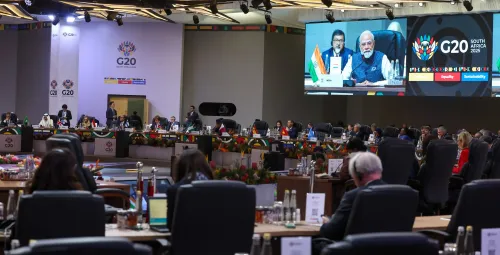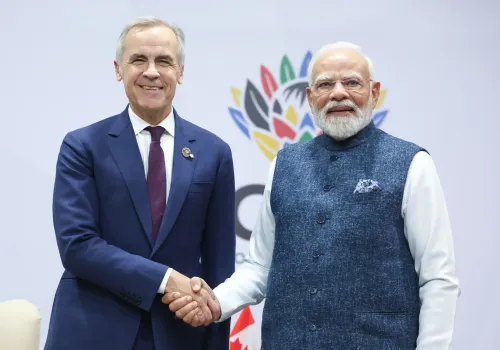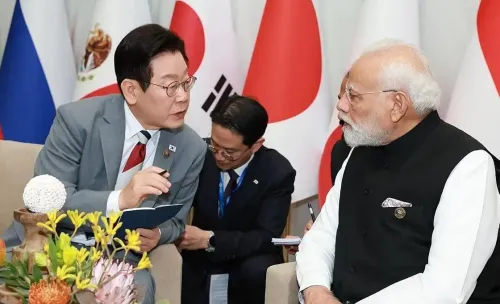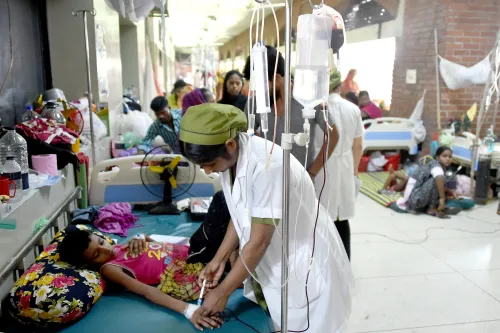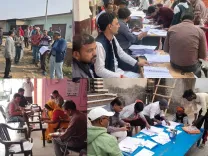How Are South Korea's Joint Chiefs of Staff and USFK Commander Enhancing Combined Command?
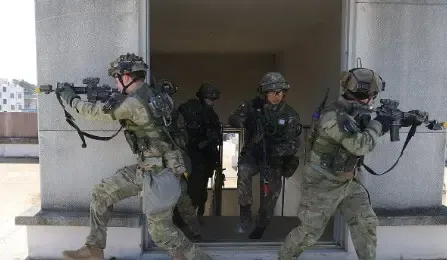
Synopsis
Key Takeaways
- Joint training exercises are essential for improving military readiness.
- The South Korea-US alliance serves as a strategic advantage against threats.
- Investments in semiconductors and batteries bolster economic cooperation.
- North Korea's response to drills highlights regional tensions.
- Leadership summits are pivotal for reinforcing alliances.
Seoul, Aug 19 (NationPress) The Chairman of South Korea's Joint Chiefs of Staff (JCS) alongside the Commander of the US Forces Korea (USFK) emphasized the significance of joint training to enhance the defense posture of the allies for peace on the Korean Peninsula, as reported by the JCS.
During their visit to a military unit amidst the ongoing Ulchi Freedom Shield exercise, JCS Chairman Admiral Kim Myung-soo and USFK Commander General Xavier Brunson, who also leads the South Korea-US Combined Forces Command, highlighted the necessity of their collaboration. Brunson remarked, "Our training is intricate, encompassing combined, joint, and all-domain operations, ensuring our readiness for any challenge." He added, "Our capability to fight tonight and win tomorrow is grounded in how we train today."
He pointed out that the South Korea-US alliance represents an asymmetric advantage to effectively counter threats from adversaries. Kim emphasized the critical role of military information support operations in contemporary warfare and urged maximizing combined operational effectiveness through close coordination.
Both leaders recognized that an ironclad defense posture serves as a formidable strength in supporting peace initiatives on the Korean Peninsula, asserting that these capabilities can only be fortified through practical training, according to the JCS.
This visit coincided with the commencement of summer drills on Monday, running for 11 days until August 28.
In response to the joint exercise, North Korean leader Kim Jong-un criticized the drills as a demonstration of war intentions and advocated for a rapid expansion of nuclear capabilities, according to state media from Pyongyang. Meanwhile, Seoul and Washington have described these annual exercises as strictly defensive.
Last week, South Korea's National Security Advisor Wi Sung-lak engaged with two visiting US Representatives to discuss strengthening industrial cooperation and the alliance between the nations, as stated by the presidential office.
Wi met with Representative Beth Van Duyne (R-Texas) and Representative Richard McCormick (R-Georgia) as President Lee Jae Myung prepares for his first summit with US President Donald Trump in Washington on August 25.
He noted that Korean companies are investing in key sectors like semiconductors and automotive batteries in Texas and Georgia, seeking support for further enhancing bilateral ties and industrial collaboration for mutually beneficial outcomes, as detailed in an official release.
Samsung Electronics is establishing a new semiconductor manufacturing facility in Taylor, Texas, while Hyundai Motor Group is building an electric vehicle plant in Georgia and collaborating with Korean battery maker SK On to set up a battery plant there, in addition to SK On's two existing plants in the state.
Wi anticipates that President Lee and Trump will reaffirm their strong alliance and engage in thorough discussions on how to advance it. The two lawmakers also committed to fully supporting a successful summit, the office reported.
Van Duyne and McCormick assured their backing for increased US investments by Korean firms to bolster economic collaboration and vowed to work towards bipartisan support in Congress for the Korea-US alliance.

